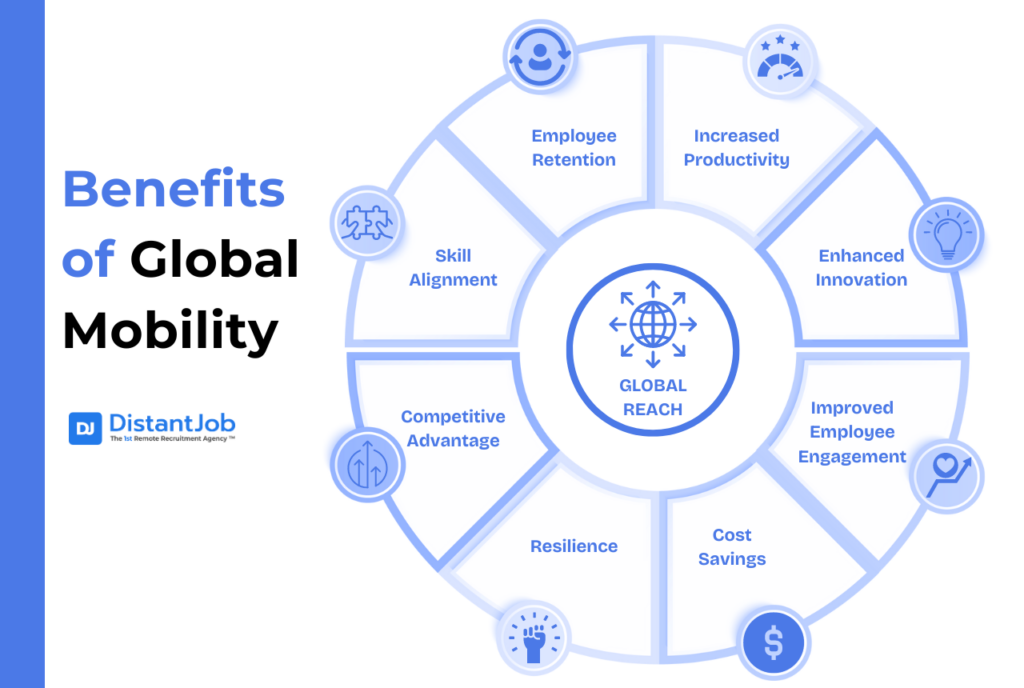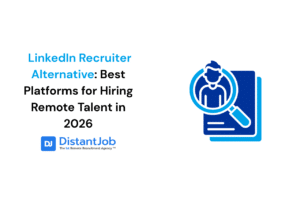Global talent mobility means moving employees across countries to facilitate the growth of a company. It is a form of international person mobilization, or in more modern terms, global talent mobility. This can refer to hiring remote employees from other countries, sending employees to other countries, or bringing employees from other countries to your local office.
Also known as employee relocation, this technique means moving people across borders without the hassle of hiring, and getting them up to speed. In many cases of larger organizations, it is getting employees that have been promoted. You immediately get a truly familiar face in another country or continent that can continue from where he/she left off. Moving employees also means another gain for employees. It’s great for moving employees into more senior positions.
Of course, in a fully remote world, there are companies like us that can achieve that without those ridiculously high relocation expenses, while getting the benefits of having a true international pool. These benefits include a much bigger international pool of candidates, the ability to operate 24 hours a day with the use of time zones, and the ability to work with people from different cultures who bring diverse perspectives.
So, if you want to grow your company, international recruitment is the way to go.
Let’s break down the benefits.
Benefits of Global Mobility

The benefits of global talent mobility are many, ranging from saving money to increasing productivity while upping your competitive edge. Let’s explore them:
Skill Alignment
Your company is in the US, but the best developers are located either in Brazil or Eastern Europe. If you’re hiring locally, chances are you’re not getting the best skills for your business. However, if you bet on global talent mobility, either by bringing them to you or employing them remotely, you can close those gaps and watch your projects soar. And global recruitment companies can help you find these all stars.
Retention Raises
I have seen the impact on employees and businesses getting the opportunity of working internationally, and the biggest impact is not just the obvious excitement of working across the border. The true power of international work opportunity is the opportunity for the employee to grow professionally.
Global exposure pretty much forces people to explore drastically different ways to do things, acquire new connections across the world, and take on leadership roles that they don’t experience in a single-country job.
This is why, statistically, companies that provide employees the benefit of working internationally, whether by providing international relocation or remote work, have a much higher retention rate.
And so it should come as no surprise that 64% of employees wouldn’t leave their current employer if they had the chance to work abroad. Win-win, you get talent and lower your turnover rates at the same time.
Productivity Raises
The reality of global talent mobility is not just the ability to get employees to work in other countries, but to get a diverse perspective, which usually means more productivity. When we let our Eastern European developers manage our North American project managers and collaborate with our South American designers, something happens that is truly fascinating: Things start moving faster because people find ways to do their work faster.
Time zones, which are considered by many to be a hurdle, become a positive, because you can start working in cycles where people complete tasks that others can pick up a few hours later. But most importantly, as I mentioned earlier, when people are forced to explore what’s happening out there across the world, they usually get super stimulated and become more productive, often in the process of trying to discover new solutions. When members in our teams get exposed to people from other countries, they get much more productive.
Enhanced Innovation
If you take a bunch of people from other countries with different backgrounds and languages and cultures, and put them (physically or virtually) in the same room, something cool happens… When people with different perspectives and thoughts come together, the result is creativity and innovation.
Competitive Advantage
When it comes to attracting (and retaining) worldwide top talent, global talent mobility is a total winner. And here are some facts to back it up: according to this survey, 92% of job seekers find that international work opportunities and experiences are life-changing, which means they’re way more likely to take them.
Improved Employee Engagement
All of the above culminate in this shinny one: engagement. Your employees are so happy, so fulfilled, so productive, and feeling so rewarded, that they end up engaging way more than they would, possibly, in other settings. And this means they contribute more and more proactively, resulting in excellence and outstanding results for your business.
Cost Savings
When we talk about actually moving the employee physically, there is definitely big savings in the form of not having to invest in the recruiting and the upgrading process. But you do have to deal with the much bigger expenses related to relocation.
Still, if you go the 100% remote route, you will have to invest in the first two elements, but not in the third one, which is by far the most costly item. And on top of that, you get the opportunity to experience additional savings by getting top talent in regions where individuals get paid 50% of what they get in North America, while still getting the highest caliber of employee.
Resilience
With all the previous benefits, resilience is a certain outcome. It shouldn’t be a surprise that organizations that implement international talent mobility gain resilience. Having access to the best people that operate in different time zones and are connected to different cultures makes your company better prepared for whatever unexpected hits you might absorb.
According to the survey, 89% of the companies say that international talent mobility improves business continuity and resilience of the business units.
Global Reach
Finally, and this is almost too obvious to mention, but that’s exactly why I’m bringing it up—it might actually be the most important point. By implementing international talent mobility, you don’t just benefit from an international pool of employees, you also benefit from an international pool of clients and partners. If you have employees across the world, why not sell on the other side of the world, or at least offer 24-hour support?
7 Main Challenges of Global Talent Mobility (And How to Solve Them)
As with everything, moving talent internationally comes with its cons. That’s just business. Here are seven challenges to be aware of:
1. Compliance Issues
When your teams are scattered everywhere, there’s a lot that changes from country to country. Especially in terms of tax and labor laws, not to mention legal requirements. Dealing with all these changes can make it very complex for businesses to expand globally.
The good news is that these compliance issues can certainly be dealt with. What we suggest you do when you get to them, is:
- Use EOR Services to your advantage. They’ll handle compliance, payroll, and serve as your HR. With all their international expertise, they’re equipped to make sure everything runs smoothly and according to different local regulations,
- Besides EOR, there are other types of legal experts who can help you operate in these uncharted waters (for you, at least). Hire and retain them, as they’ll reduce any risks of non-compliance.
2. Cultural Differences
And while many countries have certain cultures and subcultures, it is inevitable that if you work across borders, you have to deal with culture. Cultural differences are a well-known cause of disputes and miscommunication in any team.
They’re manageable too, and surviveable. You just gotta know how to deal with them. So here’s our advice:
- Make it a point to prioritize cultural training, no matter how long employees have been with you. Since new hires always come along, it’s a great way to include them, and also freshen up people’s knowledge of the different cultures within the company.
- And when you do get someone new, or some sort of issue arises, make sure internal networks are in place to help with these, and/or mentorship programs. You want to make sure your employees are supported and taken care of, which in turn prevents conflicts and turnover.
3. High Costs
Global talent mobility is definitely an expensive process. With the combination of moving expenses, immigration expenses, and everything else involved in making an employee comfortable enough to move to a new country, international relocation can go well beyond the cost of a move down the block.
In many cases, companies invest in immigrant packages (as they should), which include the cost of preparing visas and often include covering a large part of housing expenses, and the larger companies even cover expenses for the family and culture coaching. We are looking at potentially an additional 6-figure expense for each senior developer. This means a much bigger investment, which is something to consider if employee growth is part of your overall goal.
4. Issue of Data Security and Privacy
This is also a challenge for many companies, especially in the United States, when it comes to global talent mobility. We’re not just talking about protecting company data from employees. We’re talking about a whole set of laws that control data privacy.
Suddenly you become an international company, and you’re dealing with European GDPR and other data protection laws in other countries. This is extremely critical when it comes to basic things like employee information, payroll, evaluations, and everything else that is circulated inside the company.
Conclusion
Global talent mobility is a good strategy that comes with many benefits, including the opportunity to reach world markets and the capability of becoming a better, more competitive company. But we also realize that it poses major challenges.
So why deal with all the costs, challenges, and limitations of one tiny place, when you can get all the advantages mentioned above, such as gaining an international perspective, access to global talent, and productivity in terms of 24-hour work, by hiring remote employees. It’s faster and it’s cheaper.
By partnering with us, you’ll get our expertise in remote recruiting and hiring, ensuring you find the best tech talent. Even better: we’ll take care of the challenges of international employment and of managing a global payroll, so you can focus on what really matters—your business, your projects, and your people.
Reach out now, and let’s make it happen.





